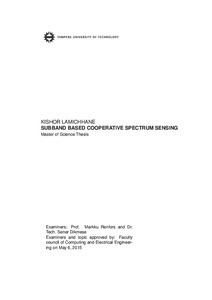Subband based Cooperative Spectrum Sensing
Lamichhane, Kishor (2015)
Lamichhane, Kishor
2015
Master's Degree Programme in Electrical Engineering
Tieto- ja sähkötekniikan tiedekunta - Faculty of Computing and Electrical Engineering
This publication is copyrighted. You may download, display and print it for Your own personal use. Commercial use is prohibited.
Hyväksymispäivämäärä
2015-11-04
Julkaisun pysyvä osoite on
https://urn.fi/URN:NBN:fi:tty-201510201655
https://urn.fi/URN:NBN:fi:tty-201510201655
Tiivistelmä
Wireless communication technology with traditional rigid spectrum allocations and low scalability is wasting lots of spectral resources. Spectral congestion is becoming critical with heavily increasing utilization of wireless communications technology. Cognitive radio (CR) technology with dynamic spectrum management capabilities is widely advocated for utilizing effectively the unused spectrum resources. The main idea behind CR technology is to trigger secondary communications to utilize the unused spectral resources. However, CR technology heavily relies on spectrum sensing techniques which are applied to estimate the presence of primary user (PU) signals.
The studies of this thesis focus on energy detection (ED) based semi-blind sensing schemes. ED based sensing only requires the knowledge of noise variance, which can be obtained according to the previous noise measurements. To counteract the practical wireless channel effects, collaborative approach of PU signal estimation i.e., cooperative spectrum sensing (CSS) techniques are investigated. CSS eliminates the problems of both hidden nodes and fading multipath channels. Additionally, subband based CSS scheme will be developed. Fast Fourier transform (FFT) and analysis filter bank (AFB) based receiver side processing methods are used. Subband energies are then processed for ED based CSS methods. The studies show that filter bank based multicarrier (FBMC) waveform with better spectral containment improves the performance significantly. Additionally, cooperative maximum-minimum energy detection (Max-Min ED) method is proposed. The proposed method is immune to the noise uncertainty effects, which is a critical issue in traditional ED based spectrum sensing. Cooperative maximum-minumum energy detection (Max-Min ED) shows better spectrum sensing performance compared with traditional CSS schemes under noise uncertainty conditions.
Overall, the thesis contributes to better understanding and handling of subband based CSS in CR system. The proposed novel cooperative Max-Min ED greatly reduces the complexity compared to existing techniques which are robust to the noise uncertainty effects. These contributions are expected to provide a useful tool for the design and implementation of flexible, efficient, and simple spectrum sensing mechanism for CR technology.
The studies of this thesis focus on energy detection (ED) based semi-blind sensing schemes. ED based sensing only requires the knowledge of noise variance, which can be obtained according to the previous noise measurements. To counteract the practical wireless channel effects, collaborative approach of PU signal estimation i.e., cooperative spectrum sensing (CSS) techniques are investigated. CSS eliminates the problems of both hidden nodes and fading multipath channels. Additionally, subband based CSS scheme will be developed. Fast Fourier transform (FFT) and analysis filter bank (AFB) based receiver side processing methods are used. Subband energies are then processed for ED based CSS methods. The studies show that filter bank based multicarrier (FBMC) waveform with better spectral containment improves the performance significantly. Additionally, cooperative maximum-minimum energy detection (Max-Min ED) method is proposed. The proposed method is immune to the noise uncertainty effects, which is a critical issue in traditional ED based spectrum sensing. Cooperative maximum-minumum energy detection (Max-Min ED) shows better spectrum sensing performance compared with traditional CSS schemes under noise uncertainty conditions.
Overall, the thesis contributes to better understanding and handling of subband based CSS in CR system. The proposed novel cooperative Max-Min ED greatly reduces the complexity compared to existing techniques which are robust to the noise uncertainty effects. These contributions are expected to provide a useful tool for the design and implementation of flexible, efficient, and simple spectrum sensing mechanism for CR technology.
